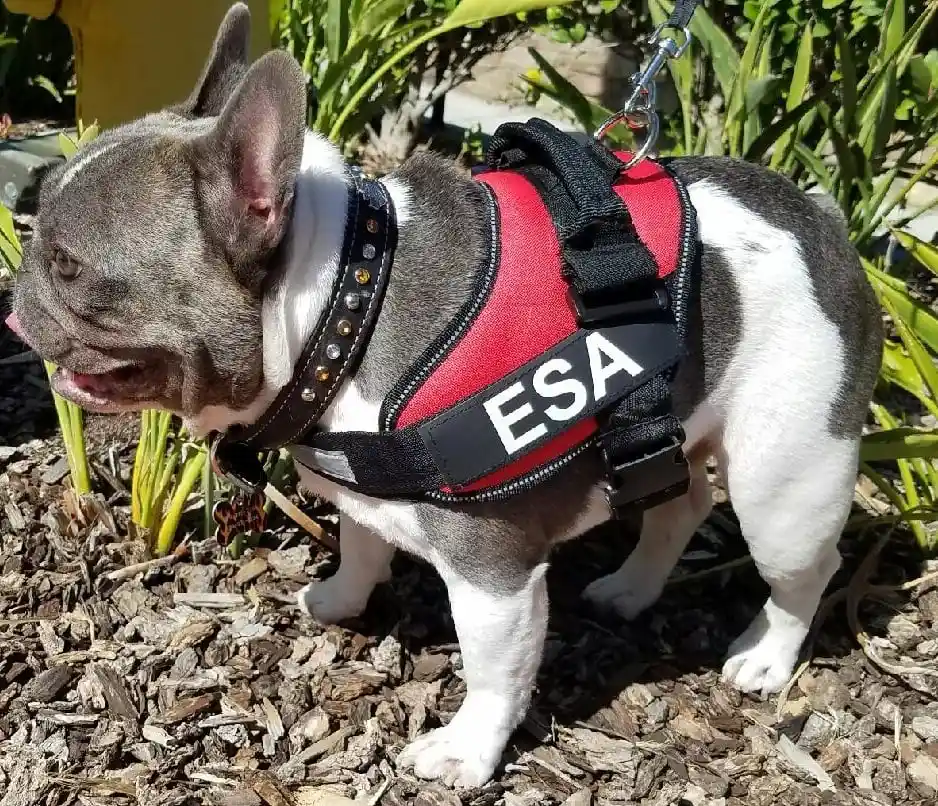Can French Bulldogs be service dogs

As a French Bulldog owner, I found myself pondering the possibility of French Bulldogs serving as service dogs. While they may not excel as guide dogs, I was curious if they could contribute to aiding individuals with other types of disabilities.
Initially, I was skeptical about their suitability for such roles. However, upon further investigation, I discovered that French Bulldogs can indeed be service dogs, though they may be better suited as emotional support or therapy dogs. The crucial factor to consider is the temperament of the dog, as they need to possess the right personality to interact effectively with diverse individuals.
This revelation intrigued me, as I had not initially considered the potential for my French Bulldog to serve as any kind of service dog. Delving deeper, I explored the training requirements for French Bulldogs to become certified service dogs.
It’s worth noting that any breed has the potential to be a service dog, as there is no discrimination based on breed when it comes to fulfilling the role.
service dogs VS emotional support dogs (ESA).
To start, it’s important to distinguish between two frequently confused entities: service dogs and emotional support dogs (ESA). These two play distinct roles and possess different legal rights and protections.

Let me explain the distinctions between service dogs and emotional support dogs:
As a service dog owner, it’s crucial to understand that these specially trained dogs perform specific tasks to aid individuals with disabilities, granting them legal access to public places. The training for service dogs is highly specialized.
On the other hand, emotional support dogs play a vital role in providing comfort and support to individuals dealing with mental health conditions.

Am I right to consider French Bulldogs as potential service dogs?
Absolutely. Their calm nature and excellent social skills make them well-suited for service dog duties.
Not only are they known for being quiet, but their compatibility with children and their overall even-tempered and sweet disposition further enhance their suitability.
Renowned for their loyalty and desire for companionship, French Bulldogs possess the traits that drive them to go above and beyond for their cherished owners.

When it comes to their physical attributes, French Bulldogs typically stand at around 11-12 inches tall, with males weighing between 20-28 pounds and females ranging from 16-24 pounds.
While their size may limit them in certain service dog tasks, particularly those requiring more substantial stature like mobility assistance, they can excel in roles such as psychiatric service dogs, providing support to handlers dealing with conditions such as PTSD.
Additionally, their potential as guide dogs is noteworthy, as they can lead their handlers in the right direction using a leash.
A French Bulldog has the potential to acquire various skills, including:
• Delivering medication to their owner
• Providing comfort to their handler during stressful situations
• Assisting in grounding owners experiencing panic attacks
• Acting as ears for their deaf owner by responding to alarms

These are just a few examples, and there are additional capabilities a French Bulldog could develop. It’s worth noting, however, that they may not be the most suitable breed for the role of a diabetic alert dog. Despite their enhanced sense of smell compared to humans, French Bulldogs, as a breed, have a relatively weaker sense of smell due to their short nasal passages.
Why choose a French Bulldog as a therapy dog?
- Alleviating Loneliness: French Bulldogs are renowned for their amiable and loyal nature, offering companionship that eases feelings of loneliness and isolation. Their presence becomes a source of comfort and connection.
- Anxiety Reduction: Spending time with a French Bulldog can be a powerful antidote to anxiety and stress. Their calm demeanor and reassuring presence provide emotional support during challenging moments. Known for their attentive nature, they instinctively respond to their owners’ emotional states, offering love and affection that fosters a sense of security.

Benefits of Having Your French Bulldog as an Emotional Support Animal (ESA):
- Aiding Mental Health Conditions:
- Supports individuals dealing with depression, PTSD, autism, and other mental conditions.
- Addressing Social Anxiety:
- Reduces loneliness for those with social anxiety.
- Helps individuals during panic attacks.
- Stress Reduction and Physical Health:
- Contributes to stress reduction in owners.
- Lowers blood pressure and cholesterol.
- Encourages physical activity, positively impacting overall well-being

- Endorphin Release through Exercise:
- Playing with or walking the French Bulldog helps release endorphins.
- Particularly beneficial for individuals dealing with depression.
- Ideal Therapy Dogs for Seniors:
- Exhibits loyalty and affection.
- Requires minimal exercise.
- Demands little grooming.
- Adaptable to limited living spaces.
- they get along with children.
How to Train Your French Bulldog as a Service Dog:
Step 1: Familiarize Yourself with ADA Title II and Title III
If you believe your French Bulldog can excel as a service dog, it’s crucial to understand ADA Title II and Title III for precise definitions. This knowledge is essential for the certification test, especially when training your Bulldog for tasks related to specific disabilities, such as alerting to low blood sugar.
Step 2: Assess Your Frenchie’s Suitability for Service Work
French Bulldogs are eligible for service dog roles like any other breed. While each breed may excel in different categories, there are no strict descriptions or limitations on the type of service dog a Frenchie can be. The key is to identify your dog’s personality and capabilities. Ensure your Frenchie is in good health, as the ADA considers age and health for suitability.
Step 3: Find a Trainer for Your Frenchie
While professional training is not explicitly required by the ADA, working with a trainer initially can be beneficial. Service animal training can be conducted at home, strengthening the bond between you and your Frenchie, who will likely be the handler.

Step 4: Training Tasks for Your Service Dog
To prepare your Frenchie as a service animal, invest time in training. While there’s no legal time requirement, it’s standard practice to train for 120 hours or more over six months, with 30 to 50 hours in public places to acclimate the dog to distractions. Focus on tasks related to your disabilities or specific tasks you want your service Frenchie to learn.
Step 5: Public Access Test
Once your Frenchie has mastered specific tasks, it’s time for the certification test. To pass, ensure your dog displays no aggressive behavior, refrains from sniffing unless for a task, does not solicit affection or food, and maintains calm behavior in public places.
Step 6: Obtain Certification and Equip Your Bulldog for Public Spaces
Provide necessary documents to show your Frenchie’s full certification as a service animal. Consider obtaining a service dog ID card or vest to enhance visibility in public places.
What other frenchies owners SAYS

If you are in the US, you are allowed to self-train. I followed a series of guides, advice from experienced handlers, and referred to the public access list. It was a lot of work but more affordable and logistically possible for me than traveling to or paying for a trainer/training program.
If you’re not in the US OR if you do live in the US think you may ever move out of the states, many countries require you to have a dog registered with and trained by an accredited/recognized service. You can find such a list online.
If that sound too expensive or logistically impossible, an emotional support animal may be right for you. ESAs don’t have public access rights, but can still be trained to provide services in the home. You may not be able to travel in an airplane cabin with them (or may need to keep them in a carrier), but you can still benefit from service tasks in your home.
My dog developed some back problems that would make it cruel of me to have him walk around as much as I do. Although he is a service dog, I’ve transitioned him to being an ESA instead. I haven’t kept up on his public access training, because I don’t take him out as a worker anymore. But he still nose his service tasks at home.
Make sure you are actually looking into an evaluation and certification for a “service animal” as it is not the same as an “emotional support animal”.
A service animal has to meet certain standards of behavior and not be distracted in public places, I believe it is also a crime to state you have a service animal if they are not specifically that.
An emotional support animal designation is mainly used so people can keep their pets in housing such as rentals that may not otherwise allow animals, and they cannot be brought to places that only allow service animals. It is a statement of the need the person has, not an assessment of the training and temperament of the animal.
Your doctor can assess your need for an emotional support or service animal, but they will not be able to designate your animal as a service animal. They might know of programs that will do that assessment though.
Frequently Asked Questions (FAQs)
Can any French Bulldog become a service dog or emotional support animal?
Yes, French Bulldogs, like other dog breeds, have the potential to become service dogs or emotional support animals. The key factors are their temperament, health, and the specific needs of the individual seeking their assistance.
Is professional training required for a French Bulldog to become a service dog?
While professional training is not explicitly required, it can be beneficial. Training can be conducted at home, but working with a professional trainer initially may provide valuable guidance.
How can I identify if my French Bulldog is suitable for service work?
Assess your Frenchie’s health, temperament, and behavior. Service dogs need to be in good health, exhibit no aggressive behavior, and be capable of performing specific tasks related to the owner’s disabilities.
What tasks can a trained French Bulldog perform as a service dog?
Trained French Bulldogs can perform various tasks depending on the owner’s needs, such as alerting to medical conditions, providing emotional support during anxiety or panic attacks, and fetching medication.
How can I train my French Bulldog for service work?
Finding a reputable trainer is recommended. Training should include specific tasks related to the owner’s disabilities, and a minimum of 120 hours of training over six months is a standard practice.
What is the difference between a service dog and an emotional support animal (ESA)?
A service dog is trained to perform specific tasks for individuals with disabilities and has legal access to public places. An emotional support animal provides comfort and support to individuals with mental health conditions but does not have public access rights.
How can I register my French Bulldog as an emotional support animal?
To register your French Bulldog as an emotional support animal, you need a prescription from a licensed mental health professional. This prescription is typically obtained by discussing the benefits with your therapist, psychologist, or psychiatrist.
What are the benefits of French Bulldogs as emotional support animals?
French Bulldogs, with their energetic and intuitive nature, are known to provide comfort and companionship. They can be a source of emotional support for individuals dealing with depression, autism, PTSD, and other psychiatric problems
FINAL WORDS
Like I wrote before Considering whether to train your Frenchie as an Emotional Support Animal (ESA) or a Service Dog is a decision with profound implications. For individuals with disabilities, the agility, intelligence, and unwavering loyalty of French Bulldogs often make them an optimal choice.
While these affectionate companions may not always align perfectly with the requirements of a service dog, their boundless love and quick responsiveness make them exceptional candidates for the role of an ESA. Their capacity to visit hospitals and provide comfort during moments of distress adds a valuable dimension to their role.
The pivotal factor in this decision lies in the training process. By actively engaging your Frenchie in diverse training tasks, you’ll swiftly discern whether their personality aligns with the demands of service training. This journey of training not only refines their abilities but also offers insights into their suitability for the distinctive responsibilities of a service dog.




